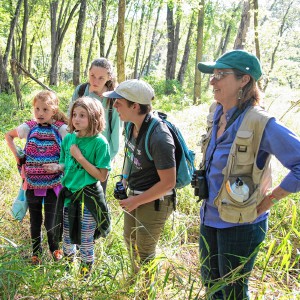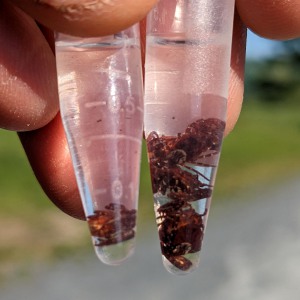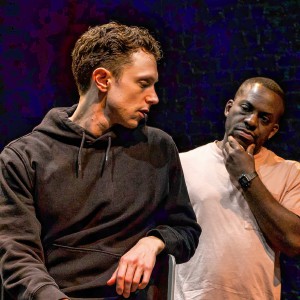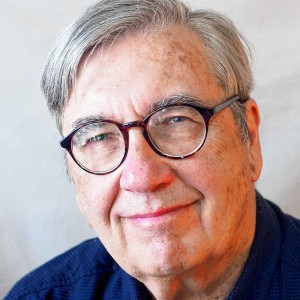A life of music and art, celebrated before the end
| Published: 05-08-2023 11:02 AM |
THETFORD — During the coronavirus pandemic, Ed Eastridge, who for the past two decades has been the Upper Valley’s most prolific guitar teacher, was forced to move his lessons online.
This was a feature of the performing arts at the time. There weren’t any live shows or travel. Eastridge likes to keep busy, so in addition to teaching he watched some YouTube videos about oil painting and started making portraits from photographs.
He dubbed around and finally had success with a wedding picture of his son and daughter-in-law. Then he started looking around for more subjects.
“I was only doing Zoom lessons,” he said. “So what I would do is take several screenshots” of his students. The resulting images became the basis for a series of portraits that he’d frame and send to his unwitting students.
“They would freak out. Without fail they would freak out,” Eastridge said.
Most of the portraits have been gathered together at the Main Street Museum in White River Junction for an exhibition to honor Eastridge. A reception for him is planned for 2 p.m. Saturday, and it’s going to be quite a to-do. The Humanizers, a band of 11- and 12-year-olds that Eastridge shepherds, is going to play, as will The Jitters, comprising Eastridge’s family: his wife, Dixie, and children Emily and Chico. Pop singer AliT, who learned how to record music from Eastridge, will perform too.
“I never planned on showing them,” Eastridge said of the portraits, “but there are so many of them now.”
The portrait show is a way to honor an artist who has worked with relatively little fanfare in the Upper Valley. He has performed with nearly every local musician at one point or another, and a generation of students has learned guitar from him.
Article continues after...
Yesterday's Most Read Articles
 Crowd turns out to honor late Ascutney Fire Chief Darrin Spaulding
Crowd turns out to honor late Ascutney Fire Chief Darrin Spaulding
 Former principal of South Royalton School released from prison
Former principal of South Royalton School released from prison
 Pick a sport and Pete DePalo’s has probably officiated it over the past 40-plus years
Pick a sport and Pete DePalo’s has probably officiated it over the past 40-plus years
 Upper Valley residents among advocates for NH aid-in-dying bill
Upper Valley residents among advocates for NH aid-in-dying bill
 NH man convicted of killing daughter, 5, ordered to be at sentencing after skipping trial
NH man convicted of killing daughter, 5, ordered to be at sentencing after skipping trial
In the past couple of months, Eastridge stopped teaching all but a few students. He hasn’t talked about it much, but he has terminal cancer. The last round of chemotherapy was so bad that he elected recently not to undergo another one, and just manage the pain.
In a recent interview in the music room at his Thetford home, Eastridge talked about his life. He’s a focused man, with an energetic, matter-of-fact way of speaking.
For example: “I learned how to paint in prison,” he said. “I can say that now that I don’t have to try to attract new guitar students.”
Arrested in 1997 for his role in a marijuana ring in the Washington, D.C., area, Eastridge was sentenced to 58 months in federal prison. That episode cut Eastridge’s life in two, but it also set him up for his second act as a teacher and artist.
“I think that he found that the rewards that you get in helping somebody learn, especially in that environment” had a profound influence, said Tuck Stocking, an Upper Valley musician who helped Eastridge get into teaching when he moved back to the Upper Valley from prison. “He definitely learned to love helping people grow.”
Eastridge grew up in Edgewater, Md., and took to music early on. (JAM, the White River Junction media nonprofit, has posted a video interview with Eastridge playing guitar and talking about his life in music.) He played folk, but also took classical guitar lessons. By the time he finished high school, in the late 1960s, he was playing in a rock band and doing pretty well with it. There were gigs available pretty much every night of the week.
“I was making more money than I knew what to do with,” he said.
His musical interests and abilities were uncommonly broad. He played in country, blues and bluegrass bands, then shifted to jazz, which was less lucrative but more rewarding artistically.
He also shifted into the technical side of the music business, as a recording engineer and record producer. He got to rub shoulders with some of the greats, recording work by, among many others, Sheryl Crow, Emmylou Harris, Wynton Marsalis, Diana Krall, Richard Thompson, Linda Ronstadt and the under-appreciated guitar wizard Danny Gatton. Eventually, he ran a company with multiple recording trucks that went to events as far afield as Nashville and New Orleans.
Looking back, he thinks his work as a recording engineer was a mistake. “The recording business really took any desire to play music out of me,” he said. “It’s really fatiguing to listen to music critically for eight or nine hours a day.”
He and his wife, Dixie, who met backstage at a concert, were married in 1983. She talked up how great a boss her husband was at the recording business; Ed kind of talked it down.
The business had only three on the payroll, he said, and employed six to seven others as freelancers, more or less full time. “It wasn’t that big,” he said.
With two young children, the Eastridges decided to move to Thetford, where Dixie’s parents were living and in need of some looking after. Ed was still traveling back and forth to the Washington area for work, though he was feeling burned out and ready to move on.
His arrest, in 1997, forced the issue.
Eastridge and some friends ran a pot ring as a way to make some extra money, he said. One member, who had taken Ed’s place in the enterprise, embezzled around $250,000 and used some of it to buy a house, which attracted the attention of the IRS. That person then gave up the other members of the ring for a reduced sentence.
With Ed already in custody in the D.C. area, the FBI raided the Eastridges’ home on Gove Hill Road, a violation that still echoes today. Dixie was allowed to leave the house only to pick Emily and Chico up at school.
“They went through every single thing we owned,” Dixie said.
There was nothing to find.
“We always felt it was pretty unjust what happened to our family, and to so many other families,” Emily said.
She was in the eighth grade at the time; Chico is two years younger.
The federal authorities seized the Eastridges’ home in Kensington, Md., and they had to sell off the studio. The authorities wanted cash.
“I think the amount we settled on was $400,000,” Eastridge said.
If they’d been able to keep the Maryland house “we could easily have retired off it,” he said. They were able to keep the Thetford house “because we had a mortgage on it.”
The authorities kept the charges out of the newspapers in Vermont and New Hampshire. (There’s no record of the FBI’s raid in the Valley News archives.) Knowledge of Ed’s arrest was contained to a small circle of people, which allowed Emily and Chico to continue at school.
He ended up serving a little over two years in prison, plus time in a halfway house in Boston. Emily recalls him going away when she was a freshman at Thetford Academy, and being back in time for her graduation, “but he hadn’t been back for long,” she said.
He summarized in his understated way: “I feel it was a little draconian.”
Chico, now 36, was 11 when his dad was arrested. He was as stoic about it as Ed: “You know, not fun, but I don’t think in the end it ended up hurting us even a bit.”
Emily, who has moved back to Thetford to care for her parents, worked for the American Civil Liberties Union in Washington state on criminal justice reform. It was she who urged her father to talk about his experience now.
“I think about it all the time,” she said. “I just saw it as state-actors harassing us and fragmenting our family over something that’s not very harmful.”
“It could have ruined his life,” Dixie said, “but it didn’t, because he’s a really smart, go-ahead man.”
As difficult as it was, the ordeal set the stage for the second phase of Ed’s life in music. When he first arrived in 1998 at FMC Devens in Massachusetts, he was housed in a temporary camp, consisting of FEMA trailers, with other low-security inmates. He was able to practice guitar seven or eight hours a day, all the playing he hadn’t been able to do while working as a recording engineer.
At his request, Dixie sent him a book on how to make pencil portraits and before long he was making portraits for his fellow inmates, who’d send them to loved ones as gifts. They’d pass him photos of wives, girlfriends, children, and Ed would make a pencil drawing.
The drawings were done in exchange for commissary items: canned fish, crackers, sweets. Somewhere out there, among the families of his former fellow inmates, are around 40 of Eastridge’s drawings.
Though he wasn’t a drug user, Eastridge moved into the prison’s larger medium security wing to take advantage of a drug rehab program. His doctor referred him and the program knocked a year off his sentence.
Among the residents at Devens were several figures from the Boston mafia, notably Gennaro “Jerry” Angiulo, the underboss of the Patriarca crime family. But the prison wasn’t a particularly dangerous place, and he never feared for his safety.
His own playing shifted more toward jazz while he was incarcerated, and he dug deeper into music theory than he had before. He wrote arrangements for dozens of songs, thinking he’d make a book out of them, only to find that the cost of licensing the songs was prohibitive.
Even more than the playing, what changed Eastridge’s trajectory was giving lessons. “I talked the recreation warden into letting me get five cheapo guitars,” and he started a guitar program. When he was released, he had better chops as a player and was ready to start teaching.
It was funny, Chico noted, how something that took Ed entirely out of the community set him up to serve it when he returned.
Stocking, a Fairlee native who dated Emily during high school, introduced Ed to Charley Conquest, then the owner of Hanover Strings. He started by teaching one day a week, then steadily built up until it was a full-time job.
For the first year, he didn’t tell Conquest about his criminal record. It turned out not to be an issue, which is not to say that Eastridge talked a lot about it.
“I was aware of it,” Stocking said, “but you could know Ed was such a good guy that it was like a bad hand of cards.”
He also started playing out a lot more. Chico said he couldn’t remember his dad playing a live show before his arrest. After his release, he played everywhere, with all manner of Upper Valley musicians.
Eastridge’s range is impossibly wide. A page on his website of tabs for guitar players includes work by J.S. Bach through Duke Ellington and the Beatles. He’s recorded bossa nova songs with singer Lydia Gray, and compositions by French modernist Erik Satie.
Whatever Eastridge has done, he’s done it with a minimum of fanfare. He brings a working-class sensibility to playing music. Dixie called him “a regular guy with a lot of talent.”
He wasn’t slowed by an initial diagnosis of colon cancer a decade ago. After treatment, he was thought to be cured, but the cancer returned in January 2021 and had metastasized.
“I don’t know how long I have,” he said. “I would imagine it’s less than a year.”
He didn’t tell a lot of people until the past month or so, because he didn’t want public encounters to turn into awkward conversations. And he’s kept busy, teaching until recently.
“You can’t really keep him down,” Chico said.
The portraits he painted are a kind of monument. They’re from his perspective as a teacher, and most of them, made in a kind of loose realism, feature a student, usually quite young, bent over a guitar. Because they were unaware they were being photographed, they appear in abstracted poses, concentrating on a sticky chord or looking at their sheet music. They’re there, focused on what they’re doing, but they’re also somewhere else, a place Ed Eastridge inhabits with ease and grace, hoping to join him.
“Zoom Portraits from the Plague Years — The Art of Ed Eastridge” is on view at the Main Street Museum through May.
Alex Hanson can be reached at ahanson@vnews.com or 603-727-3207.

 How a hurricane and a cardinal launched a UVM professor on a new career path
How a hurricane and a cardinal launched a UVM professor on a new career path Out & About: Vermont Center for Ecostudies continues Backyard Tick Project
Out & About: Vermont Center for Ecostudies continues Backyard Tick Project Art Notes: After losing primary venues, JAG Productions persists
Art Notes: After losing primary venues, JAG Productions persists  Over Easy: Marvels in the heavens, and in the yard
Over Easy: Marvels in the heavens, and in the yard 
